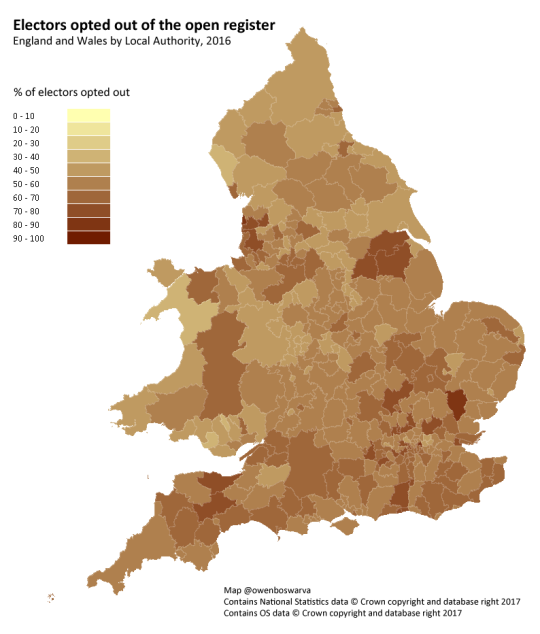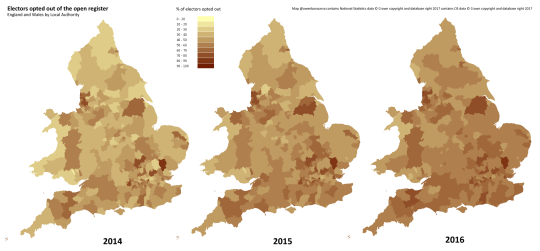
Post: 17 March 2017
According to ONS statistics released this week, most people registered to vote in England and Wales now opt out of the “open” version of the electoral register.
About 56% of electors opted out in 2016, up from 43% in 2014. However there is a wide geographic variation in opt out rates. In some local authority areas more than 80% of electors do not appear on the open register.
The open register (previously known as the edited register) is an extract of the electoral register that anyone can buy and use for a range of purposes. Although personal data in the open register still has to be processed in line with data protection legislation, the register is a relatively easy way for businesses and other organisations to acquire names and addresses without obtaining explicit consent from data subjects. Instead the onus is on electors to opt out of the register if they don’t want their details in circulation.
Below is a map of opt out rates in 2016, by local authority. The area with the highest opt out rate is Braintree in Essex (88.3%), followed by Tower Hamlets (82.5%) and Blackpool (80.4%). The area with the lowest opt out rate is Merthyr Tydfil (34.5%), followed by Gwynedd (38.6%) and Copeland (39.2%).

Electors can opt out of the open register when they register to vote in a new area or at any time by contacting their local Electoral Registration Office. The introduction of the Government’s new Individual Electoral Registration (IER) approach in 2014 has likely also provided many electors with an additional opportunity to consider whether they want to opt out.
The maps below show the increase in opt out rates from 2014 to 2016.

Opt out rates have increased in every local authority area but it’s not clear why there is such a variation between areas. There isn’t an obvious regional or urban/rural pattern.
Based on some quick calculations there seems to be a weak positive linear relationship between opt out rates and both average house prices and median annual household income. Electors were also slightly more likely to opt out in areas where the local authority is currently controlled by the Conservatives or Lib Dems.
Is the open register still fit for purpose, if more than half of the data is missing? Completeness is not important for every potential application of the register data, but must surely be relevant to most. Clearly the open register doesn’t enjoy broad public support, so perhaps it’s time for the Government to review its availability.